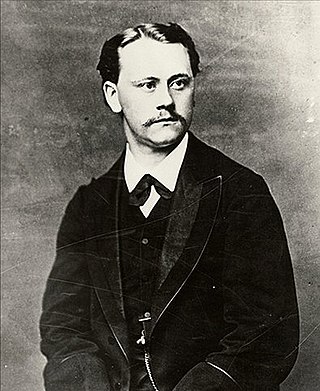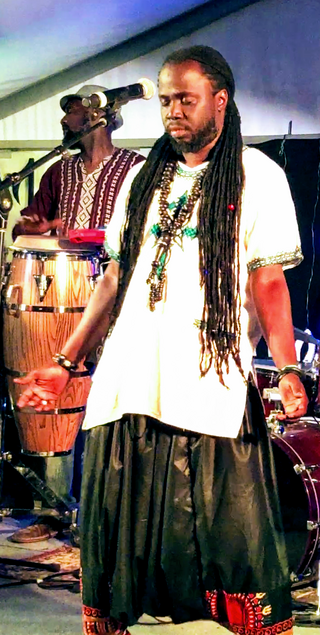Related Research Articles

Ivry-sur-Seine is a commune in the Val-de-Marne department in the southeastern suburbs of Paris, France. It is located 5.3 km from the centre of Paris.

Ahmadu Bamba Ibn Anta Saly Mbacke also known to followers as Khādimu 'al-Rasūl or "The Servant of the Messenger" and Serigne Touba or "Sheikh of Tuubaa", was a Sufi saint (Wali) and religious leader in Senegal and the founder of the large Mouride Brotherhood.

Eugène Marie Henri Fouques Duparc was a French composer of the late Romantic period.

The Panafrican Film and Television Festival of Ouagadougou is a film festival in Burkina Faso, held biennially in Ouagadougou, where the organization is based. It accepts for competition only films by African filmmakers and chiefly produced in Africa. FESPACO is scheduled in March every second year, two weeks after the last Saturday of February. Its opening night is held in the Stade du 4-Août, the national stadium.

Cinema of Africa covers both the history and present of the making or screening of films on the African continent, and also refers to the persons involved in this form of audiovisual culture. It dates back to the early 20th century, when film reels were the primary cinematic technology in use. During the colonial era, African life was shown only by the work of white, colonial, Western filmmakers, who depicted Africans in a negative fashion, as exotic "others". As there are more than 50 countries with audiovisual traditions, there is no one single 'African cinema'. Both historically and culturally, there are major regional differences between North African and sub-Saharan cinemas, and between the cinemas of different countries.

The Nigerien Progressive Party – African Democratic Rally is a political party in Niger. It was the leading political party of the pre-independence era, becoming the sole legal party of the First Republic (1960–1974). It was led by Niger's first President, Hamani Diori. After the end of military rule, the party reappeared as a minor parliamentary party led by Diori's son, Abdoulaye Hamani Diori.
Henri Duparc was an Ivorian film director and writer. He produced and wrote the 2004 film Caramel.
Dancing in the Dust or Ball in the Dust is a 1988 Ivorian film dealing with themes of polygyny. It was directed by Henri Duparc, and starring actors (Bamba Bakary, Hanny Tchelly, Naky Sy Savanne, Thérèse Taba, and Anne Kabou. In July 2021, the film was shown in the Cannes Classics section at the 2021 Cannes Film Festival.
Moussa Bamba is an Ivorian footballer who plays for Victoria Wanderers.
The Malian Party of Labour is a Marxist-Leninist party in Mali and a member of the coalition supporting the Alliance for Democracy in Mali of president Amadou Toumani Touré. Founded in 1965, it was prominent in the student resistance to the 1968-1991 military regime of General Moussa Traoré. It continues as an extra-parliamentary Hoxhaist-Communist faction within the Social-Democratic ADEMA-PASJ coalition, supporters of the Alliance for Democracy and Progress.
Baramba is a village and administrative centre (chef-lieu) of the commune of Nampé in the Cercle of Koutiala in the Sikasso Region of southern Mali. The village is 25 km north of Koutiala.
Mass media in Ivory Coast is controlled by the government. Audiovisual communications are regulated by the Conseil national de la communication audiovisuelle (CNCA), an administrative arm of the national government.

Moussa Sene Absa, Moussa Sène Absa, or Moussa Sène Absa is a Senegalese film director, editor, producer, screenwriter, painter and songwriter. He was born in 1958 in Tableau Ferraille, a suburb of Dakar, Senegal, to a Serer family.
Éric Ollivier, pseudonym for Yves Duparc, was a French writer, screenwriter and journalist, laureate of several French literary awards.

Alain Gomis is a French-Senegalese film director and screenwriter. His 2017 film Félicité was selected as the Senegalese entry for the Best Foreign Language Film at the 90th Academy Awards, making the December shortlist.

Akissi Delta also known as Loukou Akisse Delphine is an Ivorian actress and filmmaker.
The cinema of Gabon has had an uneven history. Though President Omar Bongo and his wife, Josephine Bongo, encouraged filmmaking in the 1970s, there was a 20-year hiatus until filmmaking started to grow again in the new millennium.

Yusupha Ngum is a singer and songwriter from Gambia, also known by the stage name "Joloffman". He has performed in a variety of styles, including mbalax, folk music, rap, jazz fusion, and Afro fusion music. Yusupha is currently based in Australia.
The Central African Republic is one of the world's poorest countries and the film industry is correspondingly small. The first film made in CAR appears to have been Les enfants de la danse, a short French-made ethnographic documentary of 1945. Joseph Akouissone was the first Central African to make a film in the country, with his 1981 documentary Un homme est un homme; he was followed by the documentaries made in the 1980s by Léonie Yangba Zowe. Since then a series of ongoing conflicts and economic crises have severely limited the potential growth of film-making in the country. The first feature-length drama made in the country was Le silence de la forêt, a 2003 CAR-Gabon-Cameroon co-production about the Biaka people.
References
- ↑ "Souvenir – "Bonjour c'est dimanche" Une émission de Georges Taï Benson". Abidjan.net. 6 May 2010. Retrieved 31 October 2010.
- ↑ Speciale, Alessandra, ed. (2002). Dodicesimo Festival cinema africano. COE. ISBN 978-88-8033-221-3.
- ↑ Okome, Onookome; Jonathan Haynes (1995). Cinema and social change in West Africa. Nigerian Film Corp. p. 68. ISBN 978-978-31290-2-3.